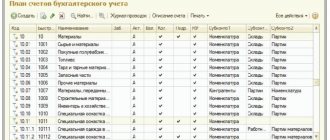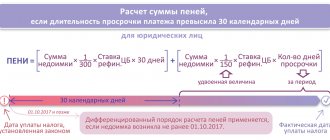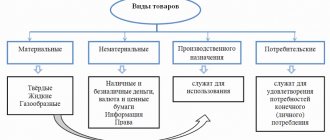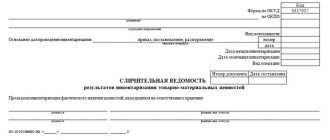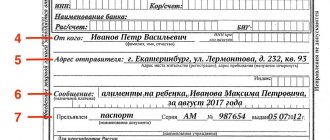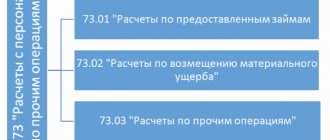Count 94: basic information
Account 94 allows you to summarize the amounts of shortages and losses of goods, including monetary resources. It can also be used to determine the amount that in the future needs to be identified as a shortage or loss. Initially calculated amounts are not subject to qualification.
Shortage is a discrepancy between the actual goods available and the amount of valuables that are reflected in the reporting documents.
In practice, shortages are identified as a result of the following actions:
- inventory;
- acceptance of goods;
- document checks.
Account 94 belongs to the category of active accounting accounts. It summarizes information about the state and changes in values owned by the organization. In addition, the score 94 is synthetic. Information on it is recorded in monetary terms.
Debit and credit of account 94
The debit takes into account damage to property depending on its category:
- goods - at cost;
- fixed assets - at residual value;
- partially unusable goods - according to the amount of losses.
The loan reflects the write-off of shortfalls depending on their size. The amount is established by concluded agreements:
- permissible losses within the normal range - are counted towards the accounting of material assets;
- above the established limits in the presence of a specific person’s guilt – counting 73;
- above the permissible value and without a guilty person - counting 91.
Credit is reflected in the same amounts and amounts as debit. Everything that reflects the debit of account 94 is subject to write-off.
Account 94 “Shortages and losses from damage to valuables”
If in the process of procurement, storage and sale of material and other assets (including cash) a shortage is identified, then initially it is reflected in account 94 “Shortages and losses from damage to assets”. This account is intended to summarize information about the amounts of shortages of material assets identified in the process of their procurement, storage and sale, regardless of whether they are subject to attribution to the accounts of production costs or the perpetrators.
Please note that if the organization has a shortage due to a natural disaster (flood, hurricane, etc.), then in this case the shortage is charged to account 99 “Profits and losses” as losses for the reporting year (uncompensated losses from natural disasters).
Let's see how account 94 “Shortages and losses from damage to valuables” works. The debit of this account reflects the following amounts:
- for missing or completely damaged inventory items - their actual cost;
- for missing or completely damaged fixed assets - their residual value (original cost minus the amount of accrued depreciation);
- for partially damaged material assets - the amount of determined losses and the like.
For shortages and damage to valuables, entries are made in the debit of account 94 “Shortages and losses from damage to valuables” from the credit of the accounts accounting for these valuables. In this case, the accounting entry used is as follows: Debit 94 “Shortages and losses from damage to valuables” Credit 01 “Fixed assets”, Credit 10 “Materials”, Credit 41 “Goods”, Credit 43 “Finished products”, Credit 50 “Cash register” . If a shortage is identified upon acceptance of inventory items received from suppliers, then the amount of the shortage within the limits provided for by the contract is attributed by the buyer, when registering these inventory items, to the debit of account 94 “Shortages and losses from damage to assets” in correspondence with the invoice 60 “Settlements with suppliers and contractors”, and the amount of losses in excess of the amounts stipulated in the contract is debited to account 76 “Settlements with various debtors and creditors” subaccount “Settlements for claims” from the credit of account 60 “Settlements with suppliers and contractors”. If the courts refuse to recover amounts of losses from suppliers or transport organizations, then the amount of this shortfall, initially recorded on account 76 “Settlements with various debtors and creditors” sub-account “Settlements on claims”, is written off to account 94 “Shortages and losses from damage to valuables” " The credit of account 94 “Shortages and losses from damage to valuables” reflects the write-off of: - shortages and damage to valuables within the limits stipulated in the contract - to the accounts of material assets (when they are identified during procurement) or within the limits of natural loss norms - production costs and sales expenses (when they are identified during storage or sale); - shortage of valuables in excess of the values (norms) of loss, losses from damage - to the debit of account 73 “Settlements with personnel for other operations” / subaccount “Calculations for compensation of material damage”; - shortage of valuables in excess of the values (norms) of loss and losses from damage to valuables in the absence of specific culprits, as well as shortage of inventory items, the recovery of which was refused by the court due to the unfoundedness of the claims - to account 91.2 “Other expenses”. In the credit of account 94 “Shortages and losses from damage to valuables” amounts are reflected in the amounts and values accepted for accounting in the debit of the specified account. At the same time, missing or damaged material assets are written off to the production cost (sales expense) accounts at their actual cost. When recovering from the guilty persons the cost of missing valuables, the difference between the cost of missing valuables credited to account 73 “Settlements with personnel for other operations” and their value reflected on account 94 “Shortages and losses from damage to valuables” is credited to account 98 “ Revenue of the future periods". As the amount due is collected from the guilty person, the specified difference is written off from account 98 “Deferred income” in correspondence with account 91 “Other income and expenses”. Shortages of valuables identified in the reporting year, but relating to previous reporting periods, recognized by financially responsible persons or for which there are court decisions to recover from the guilty parties, are reflected in the debit of account 94 “Shortages and losses from damage to valuables” and the credit of account 98 “ Revenue of the future periods". At the same time, account 73 “Settlements with personnel for other operations”/subaccount “Settlements for compensation of material damage” is debited with these amounts and account 94 “Shortages and losses from damage to valuables” is credited. As the debt is repaid, account 91 “Other income and expenses” is credited and account 98 “Deferred income” is debited. Thus, account 94 “Shortages and losses from damage to valuables” collects all losses and shortfalls identified:
- during inventory;
- when accepting valuables from suppliers (transport organizations);
In fact, count 94 performs two main functions:
- statistical (reflects the number of shortages in the enterprise). Based on this function, one can judge the work of the enterprise administration. After all, where proper accounting and control are ensured, shortages, as a rule, occur quite rarely;
- indicates the amount that must be qualified as a shortage or loss.
Having identified a shortage and reflecting this amount initially on account 94, the organization must classify it, that is, determine whether this amount is precisely a shortage.
If yes, then the administration of the organization must recover this amount from the guilty person. If this amount is classified as a loss from damage to valuables, then in this case the organization has the right to write off this amount as losses. As you can see, this function of account 94 seems to be quite important, since the rules for writing them off depend on the “status” of these amounts. It should be noted that in practice, when discrepancies are identified between accounting data and the actual availability of valuables, the administration of the organization often tries to recover this difference from the guilty parties, classifying it as a shortage. However, those whom the administration considers guilty do not always agree with this, and, as a rule, make a lot of efforts to prove their innocence. Remember: no one can be made a debtor without his consent! In other words, the defendant must admit his guilt, only then will the administration have the right to classify this difference as a deficiency and thereby create the employee’s receivables. Collection of shortfall amounts from the guilty party in compensation for inventory items identified as a result of inventory must be carried out in accordance with the Labor Code of the Russian Federation (hereinafter referred to as the Labor Code of the Russian Federation). Financial liability for damage caused to the organization during the performance of labor duties is assigned to the employee, provided that his guilt is proven. However, it must be remembered that in accordance with Article 241 of the Labor Code of the Russian Federation, the employee bears financial liability for damage caused within the limits of his average monthly earnings, unless otherwise provided by the Labor Code of the Russian Federation or other federal laws. When determining the amount of damage caused, only direct actual damage is taken into account; this rule follows from Article 238 of the Labor Code of the Russian Federation, in accordance with which the employee is obliged to compensate the employer for direct actual damage caused to him. Lost income (lost profits) cannot be recovered from the employee. Direct actual damage is understood as a real decrease in the employer’s available property or deterioration in the condition of said property (including property of third parties located at the employer, if the employer is responsible for the safety of this property), as well as the need for the employer to make costs or excessive payments for the acquisition or restoration of property. The employee bears financial liability both for direct actual damage directly caused by him to the employer, and for damage incurred by the employer as a result of compensation for damage to other persons.
An employee through whose fault damage to the enterprise was caused may admit his guilt and compensate the organization for the amount of damage caused, in whole or in part. If the amount of damage caused does not exceed the average monthly salary of the employee, recovery is made on the basis of an order from the head of the organization.
Please note that the manager’s order for recovery must be made no later than one month from the date of the organization’s final determination of the amount of damage caused.
If the one-month period has expired or the employee has not agreed to voluntarily compensate for the damage caused to the employer, and the amount of damage caused to be recovered from the employee exceeds his average monthly earnings, then the organization must apply to the judicial authorities. If the employer violates the established procedure for collecting damages caused, the employee can appeal the actions of the enterprise administration by going to court. When compensating for damage caused, it is possible to reimburse the latter with installment payment (such a clause must be specified in the employment contract). In this case, the employee must provide a written undertaking for damages indicating specific payment terms. In the event of dismissal of an employee who gave a written commitment to voluntarily compensate for damage, but refused to compensate for the specified damage, the outstanding debt is collected in court. With the consent of the employer, the employee may transfer equivalent property to compensate for the damage caused or repair the damaged property. Compensation for damages is made regardless of whether the employee is brought to disciplinary, administrative or criminal liability for actions or inactions that caused damage to the employer.
Postings to account 94
Standard postings are used based on the results of the inventory. Postings with the debit of account 94 include:
| Account credit | the name of the operation |
| Write-off of the residual value of fixed assets | |
| Write-off of the price of animals at livestock enterprises | |
| Lack of equipment | |
| Lack of investments in non-current assets | |
| Lack of materials | |
| Actual price of the lost item |
Production shortages are reflected in the following debit entries:
| Account credit | the name of the operation |
| 20 | Shortages of products that were identified in the main work in progress |
| 23 | Shortages of products that were identified in auxiliary work in progress |
| 29 | Shortage of products that were identified in unfinished service production |
Correspondence takes into account both the natural loss of valuables and damage to property in the presence of guilt of the financially responsible person. Moreover, postings allow you to take into account losses without the fault of a specific person.
Write-off of shortages within the limits of natural loss
As a result of natural physical and chemical processes, such as weathering, drying, spraying, crumbling, freezing, leakage, spillage (when pumping and dispensing liquid goods) and so on, the weight of the product or product may change during storage.
In addition, the product may deteriorate during transportation or unloading due to its natural fragility, tenderness (fruit) or other properties. It is generally accepted that the listed processes lead to a natural loss of goods.
The norms of natural loss should be understood as the maximum permissible amount of irretrievable losses of materials that occur during transportation and storage of inventory items due to changes in the physicochemical and biological properties of materials.
And for these processes, government bodies establish its norms, within which the organization can write off the shortage as production or distribution costs and take it into account for taxation
Natural loss rates vary depending on storage parameters: climate zone, storage conditions and shelf life. Storage conditions include the quality of packaging, temperature conditions, and the quality of premises.
There are standards for transportation by various modes of transport and storage of non-food products (petroleum products, easily evaporating products of the chemical industry, some bulk cargo).
As we have already noted, the write-off of identified shortages of inventory items within the limits of natural loss norms is carried out for production or distribution costs.
Note!
The application of natural loss norms is possible only if such norms are approved by regulations of the relevant ministries and departments. If there are no such norms, the entire shortage is considered to be in excess of the norm and is subject to attribution to the guilty persons in full.
The amounts of shortages initially recorded on account 94 “Shortages and losses from damage to valuables”, within the limits of natural loss, are written off at actual cost to the debit of production cost (selling expenses) accounts, for example, to the debit of accounts 20 “Main production”, 23 “Auxiliary production”, 25 “General production expenses”, 26 “General business expenses”, 29 “Servicing production and facilities”, 44 “Sales expenses”.
Let's consider what has been said using a specific example - a pharmacy. For pharmacies today there are norms of natural loss, approved by Order of the Ministry of Health of Russia dated July 20, 2001 No. 284 “On approval of norms of natural loss of medicines and medical products in pharmacy organizations, regardless of the organizational and legal form and form of ownership.”
Example.
Pharmacy "Zdorovye" produces medicines. As a result of the inventory, a shortage of ethyl alcohol was identified in the production department of the pharmacy - 200 ml in the amount of 100 rubles, which resulted from the manufacture of medicines according to doctors' prescriptions.In accordance with Appendix 1 to the Order of the Ministry of Health of Russia dated July 20, 2001 No. 284 “On approval of norms of natural loss of medicines and medical products in pharmacy organizations, regardless of the organizational and legal form and form of ownership,” the norm of natural loss is 1.9% of the amount of alcohol sold during the inter-inventory period.
To determine how much alcohol should be written off as production costs, the accountant of the pharmacy institution must draw up an accounting certificate, reflecting in it how much alcohol has been used by the pharmacy institution since the previous inventory. Then the amount of alcohol used in the period between inventories must be multiplied by the rate of natural loss.
Suppose that during the period between inventories, the Zdorovye pharmacy used 15 liters of ethyl alcohol, multiplying them by the norm, we obtain the amount of alcohol that is written off as production and distribution costs: 15 liters x 1.9% = 0.28 liters. Based on this calculation, the shortage of alcohol (200 ml) can be fully attributed to costs.
The following entry must be made in accounting: Debit 20 “Main production”, Debit 44 “Sales expenses” Credit 94 “Shortages and losses from damage to valuables” - 100 rubles - the shortfall within the limits of natural loss norms is written off as costs.
End of the example.
Note!
Natural loss rates are very important for many sectors of the national economy, especially for trade and public catering. However, it is in relation to these industries that this issue remains unresolved.
Order of the Ministry of Foreign Economic Relations of Russia dated December 19, 1997 No. 631 “On the norms of natural loss” established the validity of the norms defined therein from 1997.
The standards were developed; all trade organizations, regardless of their form of ownership, from January 1, 1997 were ordered to be guided by the following norms of natural loss, given in the Appendix to this order:
- Norms of natural loss of food products in trade, approved by Order of the Ministry of Trade of the USSR dated April 2, 1987 No. 88 “On approval of norms of natural loss of food products in trade and instructions for their use.”
- Norms of natural loss of fresh potatoes, vegetables and fruits in the retail trade network, approved by Order of the Ministry of Trade of the RSFSR dated February 22, 1988 No. 45 “On approval of norms of natural loss of fresh potatoes, vegetables and fruits in the urban and rural retail trade network and instructions for their application "
- Norms of natural loss of fresh potatoes, vegetables and fruits during long-term and short-term storage in bases and warehouses of various types, approved by Order of the Ministry of Trade of the USSR of March 26, 1980 No. 75 “On approval of norms of natural loss of food products in trade” - Appendices No. 12 - 15.
- Norms for natural loss of meat and meat products during refrigeration processing and storage in refrigerators (Appendix No. 1, tables 3 - 7 to Order of the USSR Ministry of Trade dated December 27, 1983 No. 309 “On approval of norms for natural loss of meat and meat products during refrigeration processing and storage in distribution refrigerators trade").
- Norms for natural loss of sausages and smoked meats when stored in refrigerators (Appendices No. 1 and No. 2, Table 10 to Order of the USSR Ministry of Trade dated December 27, 1983 No. 309 “On approval of norms for natural loss of meat and meat products during refrigeration processing and storage in distribution refrigerators of trade ").
- Norms for natural loss of imported sausages when stored in distribution refrigerators (Appendix No. 2 to Order of the Ministry of Trade of the RSFSR dated July 23, 1976 No. 243).
- Norms of natural loss of frozen poultry and rabbit meat during freezing and storage in refrigerators (Appendices No. 1 and No. 2, tables 1 - 3 to Order of the USSR Ministry of Trade dated February 6, 1991 No. 13).
- Norms for natural loss of poultry and rabbit meat during refrigeration (Order of the USSR Ministry of Meat and Processing Industry dated December 31, 1982 No. 291 “On approval of norms for shrinkage of meat and offal of poultry and rabbits during refrigeration and storage”).
- Norms of natural loss of chilled meat and by-products during refrigeration processing and storage in refrigerators (Appendices No. 1 and No. 2, tables 1 - 3 to Order of the USSR Ministry of Trade dated August 18, 1988 No. 150 “On approval of norms of natural loss of chilled meat and by-products during refrigeration processing and storage on distribution refrigerators of trade").
- Norms for natural loss of offal frozen in blocks when stored in refrigerators (approved by the Committee of the Russian Federation on Food and Processing Industry on July 29, 1993).
- Norms for egg losses during long-term storage on distribution refrigerators for wholesale trade in the cities of Moscow and Leningrad (Appendices No. 1 and No. 2 to the Letter of the Ministry of Trade of the RSFSR dated January 25, 1988 No. 1-733/62-28).
- Norms for the natural loss of meat and non-block by-products in the chambers of the Moskhladokombinat No. 12 - now JSC "Trading House "Preobrazhensky" (Order of the Ministry of Trade of the RSFSR dated October 2, 1961 No. 594 "On changing the norms of natural loss of meat and by-products when stored in the chambers at the Moscow refrigerator No. 12 ").
- Norms of natural loss of meat and meat products during intercity transportation in refrigerated trucks (Appendix No. 2 to Order of the Ministry of Trade of the RSFSR dated March 1, 1985 No. 54 “On the norms of natural loss and waste of food products in trade”).
The standards were approved:
- for food products in the retail network of state and cooperative trade;
- food products when stored in warehouses and bases of retail and trade catering organizations;
- food products during storage and distribution at small wholesale bases, storage and distribution in pantries of public catering establishments;
- cheeses when stored in distribution refrigerators of trade;
- food products when transported by road and horse-drawn transport.
However, by Order of the Ministry of Economic Development and Trade of the Russian Federation dated January 17, 2001 No. 8 “On the suspension of the Order of the Ministry of Foreign Economic Relations of Russia dated December 19, 1997 No. 631 “On norms of natural loss”, the validity of the above-mentioned document was suspended due to the fact that it did not pass state registration.
The entry into force of Chapter 25 of the Tax Code of the Russian Federation (hereinafter referred to as the Tax Code of the Russian Federation) has somewhat changed the situation and it cannot be said that it is for the better. In accordance with subparagraph 2 of paragraph 7 of Article 254 of Chapter 25 of the Tax Code of the Russian Federation, losses from shortages and (or) damage during storage and transportation of inventory items are equated to material expenses for tax purposes within the limits of natural loss norms approved in the manner established by the Government of the Russian Federation .
Thus, the norms for the natural loss of inventory during their sale, storage and transportation, approved by the regulations of the relevant ministries and departments and in force until January 1, 2002 in connection with the entry into force of Chapter 25 of the Tax Code of the Russian Federation, were declared invalid.
Consequently, in accordance with Chapter 25 of the Tax Code of the Russian Federation, the write-off, within the limits of natural loss norms, of losses from shortages and (or) damage to inventory items during their sale at trading enterprises does not apply to material expenses for tax purposes.
Currently, interested ministries and departments, led by the Ministry of Economic Development and Trade of the Russian Federation, are working to prepare a draft resolution of the Government of the Russian Federation, approving the procedure for coordinating, approving, revising and applying norms of natural loss in terms of losses from shortages and (or) spoilage during storage and transportation of inventory items across sectors of the economy.
Pending the approval by the Government of the Russian Federation of the procedure for agreeing, approving, revising and applying the norms of natural loss in terms of losses from shortages and (or) damage during the storage and transportation of inventory items in sectors of the economy, expenses associated with losses from shortages and (or) damage when storing and transporting inventory items within the limits of natural loss, cannot be equated to material costs for tax purposes and must be written off against expenses that do not reduce profit taxation.
It should be remembered that writing off losses as distribution costs during transportation and storage of goods will be possible only if new norms for natural loss are approved.
The amount of commodity losses due to natural loss during transportation is determined based on the weight of goods (net) accepted for transportation and the norms of natural loss. Natural loss is not accrued for goods received and released without excess weight of the sender, without opening the container, for goods sold in transit, for piece goods and goods written off as a result of damage, scrap, or damage.
The procedure for approving norms of natural loss during storage and transportation of inventory items in accordance with Article 254 of the Tax Code of the Russian Federation was established only on November 12, 2002 by Decree of the Government of the Russian Federation of November 12, 2002 No. 814 “On the procedure for approving norms of natural loss during storage and transportation of inventory items.” material values." Moreover, in paragraph 5 of this Resolution, the federal executive authorities were asked to approve these norms before January 1, 2003. However, today the norms for natural loss during the storage and transportation of inventory items have not been adopted.
Thus, throughout 2002, according to the Russian Ministry of Finance and the Russian Tax Ministry, for tax purposes all norms of natural loss previously approved by ministries and departments are not applied. For accounting purposes, these standards can be used.
It turns out that there are currently no norms for natural loss developed after 2001 by Russian relevant departments. There is also no clarity regarding the possibility of applying the norms of natural decline developed and adopted in the 1960s and 1980s. An exception is the Ministry of Health of Russia, which, by Order No. 284 of July 20, 2001 “On approval of the norms of natural loss of medicines and medical products in pharmaceutical organizations, regardless of the organizational and legal form and form of ownership,” approved the norms of natural loss of medicines and medical products in pharmacy organizations, regardless of their legal form and form of ownership.
In addition, in 2004, the Ministry of Industry, Science and Technology of the Russian Federation, in agreement with the Ministry of Economic Development and Trade of the Russian Federation, approved:
- Norms for natural loss during storage of chemical products (Order No. 22 of January 31, 2004 “On approval of norms for natural loss during storage of chemical products”).
- Norms for natural loss of cargo weight in the metallurgical industry during transportation by rail (Order No. 55 of February 25, 2004 “On approval of norms for natural loss,” developed jointly with the Ministry of Railways of the Russian Federation).
The question arises: is it possible to use the above-listed norms of natural loss?
According to most authors, these standards can be applied in accounting. But the application of the norm of natural loss, which is currently suspended, for tax purposes is a controversial issue.
In accounting, shortages of goods identified as a result of inventory are reflected in the debit of account 94 “Shortages and losses from damage to valuables” in correspondence with account 41 “Goods” for the amount of their actual cost.
Depending on the sources of compensation, the amounts of losses of goods recorded in account 94 “Shortages and losses from damage to valuables” are written off to the debit of various accounts.
According to paragraph 3 of Article 12 of Law No. 129-FZ, losses of goods within the limits of natural loss norms are attributed to distribution costs, and in excess of these norms - at the expense of the guilty parties.
If the perpetrators are not identified or the court refuses to recover damages from them, then the losses are written off to the financial results of the organization.
The write-off of losses of goods within the limits of natural loss is reflected in the following entry:
| Account correspondence | Contents of operation | |
| Debit | Credit | |
| 44 | 94 | The cost of missing goods is written off |
| 73, 76 | 94 | Losses in excess of natural loss are written off |
| 91-2 | 94 | If there are no guilty parties or the court refuses to recover damages, the following entry is made |
Please pay attention! When applying the norms of natural loss, it is necessary to remember that these norms are marginal, that is, this is the maximum amount of losses that can be attributed to distribution costs.
If the losses identified as a result of the inventory are less than this limit value, then the actual amount of losses is written off.
Natural loss rates apply only to those goods that were sold during the reporting period, regardless of their shelf life in the retail store.
Note!
At present, the issue of the need to restore the “input” VAT attributable to the amount of the shortage has not been resolved at the regulatory level.
Representatives of tax authorities, in private responses to requests from taxpayers, adhere to the following position: VAT amounts on missing goods are subject to restoration if they were previously claimed for deduction.
If the shortage is recovered from the guilty persons, then the VAT amounts are also subject to recovery from the guilty persons. This conclusion is made by tax officials on the basis of paragraph 2 of Article 171 of the Tax Code of the Russian Federation, which determines that VAT amounts on goods purchased to carry out transactions recognized as objects of taxation are subject to deductions. In the event of a shortage, such property can no longer be used to carry out taxable transactions, therefore VAT is subject to restoration.
However, a number of authors do not consider the position of the tax service indisputable on the grounds that the need to restore VAT when a shortage of goods is identified, including within the limits of natural loss, is not established by law.
As a general rule, VAT amounts presented by the supplier to the buyer of goods are subject to deduction from the buyer according to the rules of Article 172 of the Tax Code of the Russian Federation. Having received and paid for goods intended for further resale, the buyer completely rightfully exercised his right to deduct VAT.
The buyer does not have the right to deduction if, at the time of purchase of goods, the cases listed in paragraph 2 of Article 170 of the Tax Code of the Russian Federation occur:
- acquisition (import) of goods used for transactions not subject to taxation (exempt from taxation);
- acquisition of goods for sale outside the territory of the Russian Federation;
- purchase of goods by organizations that are not taxpayers in accordance with the law or exempt
- from fulfilling the taxpayer’s obligations regarding the calculation and payment of VAT;
acquisition of goods for their further transfer, if such transfer is not recognized as the sale of goods in accordance with paragraph 2 of Article 146 of the Tax Code of the Russian Federation.
In these cases, in accordance with paragraph 3 of Article 170 of the Tax Code of the Russian Federation, the amounts of VAT accepted for deduction on purchased goods are subject to restoration and payment to the budget.
Disposal of goods as a result of losses during their sale does not apply to the above cases. Tax legislation does not contain other cases and grounds for the restoration of VAT amounts.
Therefore, we can conclude that tax legislation does not oblige taxpayers to restore “input” VAT, which falls on the cost of commodity losses.
But it must be taken into account that such an approach will most likely lead to a dispute with the tax authority. Then the organization will have to defend its case in court.
It should be noted that there are cases where organizations have won a claim in a similar situation. For example, the FAS of the Volga-Vyatka District, in its Resolution of May 23, 2003 in case No. A31-2989/15, sided with the organization, citing the provisions of paragraph 2 of Article 171 of the Tax Code of the Russian Federation.
The court found that the organization lawfully claimed VAT for deduction on goods purchased for further resale, which were subsequently lost.
The court refused to allow the Tax Inspectorate to recover from the organization the amount of VAT attributable to lost (stolen) goods, since apart from paragraph 2 of Article 171 of the Tax Code of the Russian Federation, there are no other restrictions on the use of deductions in the legislation.
Now about the issue of applying the norms of natural loss for profit tax purposes. The position of the tax authorities on this issue is clear.
It is set out in paragraph 5.1 of the Methodological recommendations for the application of Chapter 25 “corporate income tax” of part two of the Tax Code of the Russian Federation, approved by Order of the Ministry of Taxes of Russia dated December 20, 2002 No. BG-3-02/729 “On approval of Methodological recommendations for the application of Chapter 25 “Organizational profit tax”, part two of the Tax Code of the Russian Federation.”
In accordance with this paragraph, losses can be taken into account only if the norms of natural loss are approved. The Ministry of Finance of the Russian Federation, by its Letter No. 04-02-03/140 dated November 6, 2003, reports that in accordance with subparagraph 2 of paragraph 7 of Article 254 of Chapter 25 “Organizational Profit Tax” of the Tax Code of the Russian Federation from January 1, 2002 to material expenses for tax purposes are equivalent to losses from shortages and (or) damage during storage and transportation of inventory items within the limits of natural loss norms approved in the manner established by the Government of the Russian Federation.
Thus, the norms for the natural loss of inventory during their sale, storage and transportation, approved by regulations of the relevant ministries and departments and in force until January 1, 2002, in connection with the entry into force of Chapter 25 of the Tax Code of the Russian Federation cannot be equated to material costs for profit tax purposes and applied when determining the tax base for income tax.
This means that due to the sluggishness of officials, organizations cannot apply natural loss rates to reduce income taxes.
Many people do not agree with this provision and go to court. There is a well-known arbitration practice when courts take the position of organizations.
For example, the Resolution of the Federal Antimonopoly Service of the West Siberian District dated April 5, 2004 in case No. F04/1731-330/A46-2004 states that untimely approval by authorities of new norms of natural loss should not prevent taxpayers from applying Article 254 of the Tax Code of the Russian Federation, if the norms of natural decline that were in force before January 1, 2002 were not abolished.
Closing Account 94
Account 94 is closed on credit with the same amounts and values provided for by debit. Write-off depends on the actual cost of goods:
- main costs – debit account 20;
- the employee’s fault – debit account 73;
- absence of the culprit – debit of account 91;
- force majeure circumstances – debit account 99.
Account 94 does not include valuables that were damaged as a result of natural disasters. Before closing the account, a shortage is established and the reasons that led to the discrepancy between the actual quantity of goods and the values in the accounting documentation are identified. The calculated amounts are written off either to the culprit or to the organization itself.
